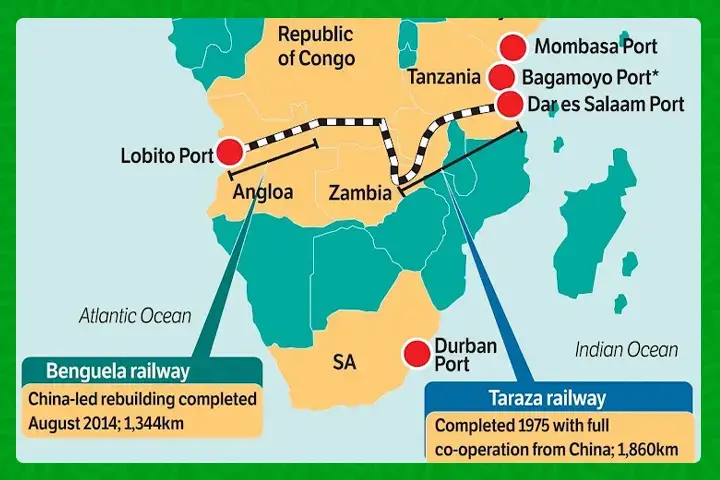
The Lobito Corridor is emerging as a game-changer for Africa’s agricultural potential, serving as a strategic gateway for agricultural and mineral exports. This vital trade route, extending from the mineral-rich areas of Zambia and the Democratic Republic of Congo (DRC) through Angola to the Atlantic port of Lobito, is set to revolutionize the agro-processing industry in the region. It is not only reshaping transportation infrastructure but also opening unprecedented opportunities for farmers, investors, and businesses across Africa, Europe, and America.
Nyembe Chapeshamano, founder and director of consultants Strategic Connexion, highlights the transformative potential of the Lobito Corridor for the agricultural sector. “The Lobito Corridor is set to revolutionize the fresh produce market, creating unprecedented opportunities for businesses and investors across Africa, Europe, and America,” he says. By connecting landlocked countries like Zambia to international markets, the corridor is playing a crucial role in boosting cross-border trade and fostering economic development.
Enhancing Zambia’s Agro-Processing Capabilities
The Zambian government has long recognized the importance of the agro-processing sector as a key driver of economic growth. Identified as one of the eight priority clusters in Zambia’s national industrial policy, the agro-processing industry holds immense potential for value addition in cereals, milling products, soy products, animal feed, tobacco, non-alcoholic beverages, sugar, and confectionery. This sector has thrived in Zambia due to favorable conditions, including fertile soil, abundant groundwater resources, and a low population density, according to the World Bank.
Zambia’s agro-processing industries benefit from a combination of strong local demand and expanding international market access. Statista projects that the fresh fruit market in Zambia will reach $405.70 million in 2024, with an expected annual growth rate of 10.12% from 2024 to 2029. The total volume is anticipated to reach 230.30 million kilograms by 2029. These figures underscore the growing importance of the agro-processing sector, both domestically and internationally.
Chapeshamano explains that the Lobito Corridor will play a key role in unlocking Zambia’s agricultural potential by facilitating seamless transportation of fresh produce from Zambia’s northwestern province to global markets. “The region, endowed with fertile land and abundant natural resources, will become a hub for processing and packaging fresh produce, adding value to the supply chain and meeting the stringent quality standards of international markets,” he adds.
The Role of Infrastructure and Investment
The Lobito Corridor is not just a transportation route; it is a catalyst for agricultural development and investment. The corridor’s infrastructure improvements are paving the way for new agro-processing facilities, manufacturing plants, and canning factories in Zambia’s northwestern province. This will not only create jobs but also enhance the competitiveness of Zambia’s agricultural products on the global stage.
Furthermore, the groundwork for private-sector investment in Zambia’s agricultural and agro-processing sectors has already been laid through initiatives supported by international organizations like the World Bank. While some previous projects faced challenges, the opening of new markets through the Lobito Corridor presents an opportunity to renew focus on agricultural investment. With increased private-sector participation, Zambia can further develop its agro-processing industry and attract new investors seeking to capitalize on the region’s natural advantages.
Supporting Regional Development and Cross-Border Trade
The Lobito Corridor also has broader implications for regional development. By improving transportation and logistics infrastructure, the corridor enables more efficient trade between Zambia, Angola, and the DRC. This strengthens economic ties between these countries and enhances their collective bargaining power in international markets.
In addition to benefiting agricultural exports, the corridor also supports the export of minerals and other natural resources, diversifying Zambia’s economy and reducing its reliance on copper exports. The Lobito Corridor is thus helping Zambia build a more resilient and diversified economy, with agriculture playing a central role in this transformation.
Seizing the Future of Agro-Processing in Zambia
As the Lobito Corridor continues to expand its reach and influence, Zambia is poised to become a major player in the global agricultural market. The country’s agro-processing sector, supported by favorable natural conditions and strong government backing, is set to blossom thanks to this strategic trade route. For businesses, investors, and policymakers, the time is now to capitalize on the opportunities presented by the Lobito Corridor and drive the growth of Zambia’s agricultural economy.
In conclusion, the Lobito Corridor represents more than just a transportation route—it is a beacon of hope for Zambia’s agricultural sector, unlocking new opportunities for growth, investment, and development. As Zambia strengthens its position as a regional hub for agro-processing and agricultural exports, the Lobito Corridor will continue to play a pivotal role in shaping the future of the country’s economy and boosting its global competitiveness.


















